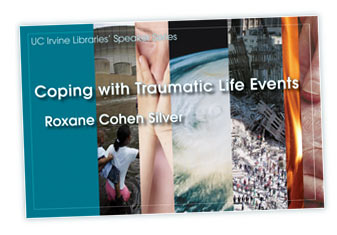

![]()
Menton Papers Enhance University Archives
Visit of Ambassador to Vietnam
Literary Luncheon with Lynette Brasfield
Roxanne Silver on Coping with Trauma
Piano Concert with Nors Josephson
 |
![]()

Roxane Cohen Silver
On March 15, the Libraries’ Speaker Series featured Roxane Cohen Silver, Professor of Psychology and Social Behavior and Professor of Medicine at UCI, and a national expert in the field of stress and coping, in a program about how individuals cope with traumatic life events. Silver talked about her 25 years of research on both individual and community traumas, ranging from personal loss to 9/11, as well as what she has identified as common misconceptions of the coping process.
In November 2005, Silver testified at the U.S. House of Representative’s Committee on Science hearing entitled The Role of Social Science Research in Disaster Preparedness and Response. She recently completed a three-year, National Science Foundation-funded national study of how people have responded to Sept. 11.
Silver said that public misconceptions about how people are supposed to respond to traumatic events – fed by media and clinical lore – often stand in sharp contrast to what research shows about how they actually react.
“After conducting studies on literally thousands of participants across a wide variety of victimizations, one conclusion I can draw about how people respond to traumatic life events is that there is no one, universal response,” Silver said. “There’s no right or wrong way to respond to the trauma of a natural disaster like Hurricane Katrina, or the man-made destruction of the 9/11 terrorist attacks. And above all, a person doesn’t have to directly experience a national traumatic event to be psychologically affected by it."

Silver said it’s important for the public to understand how people respond to traumatic events because misconceptions about how people cope can be devastating to a trauma victim. “It can lead to a self-perception that one isn’t coping appropriately, or that one is going crazy,” she said.
More long-term research is needed on how people cope with traumatic events, both to overcome public misconceptions and help trauma victims recover, Silver said. “Events like the recent hurricanes and 9/11 have had an enormous impact on life in our country. Hopefully we can draw lessons from these disasters, so that they make us stronger, more flexible, and more effective in providing support.”